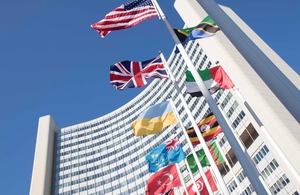71 countries call to remove online child sexual abuse materials
Seventy-one countries have called for the urgent removal of online child sexual abuse materials in the first of its kind 'call to action' at the United Nations.

For the first time at the UN, 71 governments have come together and agreed a call to action statement urging further and faster action to remove known child sexual abuse materials from online.
In 2022, National Center for Missing & Exploited Children cyber-Tipline received more than 32 million reports of suspected child sexual exploitation and abuse.
The call to action statement emphasises that there is growing and global consensus that more needs to be done and with greater urgency to keep children safe across our communities and online all over the world.
The call to action is informed by 2 days of expert discussions hosted by the UN Office on Drugs and Crime (UNODC), supported by the UK government. These discussions brought together a wide range of experts and activists, including from child protection charities, the public sector, the private sector and the legal and finance sectors. The present financial institutions accepted that they can play a central role to encourage businesses, to which they provide banking facilities, to identify child sex abuse material, to delete it and prevent it from being reuploaded.
In the call to action, 71 countries acknowledge that the creation, possession and dissemination of child sexual exploitation and abuse material puts children at risk of further sexual exploitation and abuse, and that the widespread dissemination of this material can normalise this conduct and fuel demand for more. The statement recognises the long-lasting trauma caused to victims and survivors, including from the repeated online circulation of images or videos, and the need to increase public awareness of such dangerous materials.
UK Ambassador, Corinne Kitsell, said:
The role of technology companies is central to tackling the issue of online child sexual exploitation and abuse. Of particular concern to the UK, is the move by companies to implement end-to-end encryption, which without robust child safety measures will make the detection and removal of child sexual abuse materials even more challenging, and particularly for law enforcement efforts in responding, pursing offenders and safeguarding children.
Julie Inman Grant, Australia’s eSafety Commissioner, said:
More governments are finally saying, enough is enough. We need to take action, starting today.
Lianna McDonald, Executive Director, Canadian Centre for Child Protection (C3P), said:
The message that we want delivered comes from the victims and survivors we hear from every day; get child sexual abuse material off the internet. We welcome the call to action from UNODC and the UK government. This leadership is much needed and underscores the necessity for a global commitment and response to protect children around the world.
An anonymised survivor said:
We are in a battle to be seen as more than files that uploaded and downloaded again and again, as more than images on a device or computer screen, as more than a paycheque to take to the bank. We want tech companies to believe our stories, see our pain and to act for no other reason than it is the right thing to do.
Alexandra Martins, Team Leader, Violence against Children, UNODC, said:
The UNODC is committed to supporting member states to tackle this appalling issue. Convening the expertise of those around the globe has shown us how we can work together to make the world safer for children.
Background
Tackling child sexual exploitation and abuse continues to remain a priority among international partners, with the UK government seizing every opportunity to call for greater collective international action on these crucial issues. Online child sexual exploitation and abuse continues to rise at exponential rates across the world and increasingly involves younger children. In the IWF’s Annual Report for 2022, published data shows a 13% increase in the number of 7 to 10-year-old children depicted in the child abuse material.
The Canadian Centre for Child Protection (C3P) operates Project Arachnid, a victim centric set of tools to reduce the availability of Child Sexual Abuse Materials. Since 2017, Project Arachnid has issued over 29 million removal requests to electronic service providers. Their analysis in 2016 also showed that 78% of the images Cybertip.ca examined contained depictions of children below the age of 12 and 63% of these were children under the age of 8. An analysis conducted by the Canadian Centre for Child Protection (C3P) in 2016 showed that 78% of the images Cybertip.ca examined contained depictions of children below the age of 12 and 63% of these were children under the age of 8.
We need to continue to push for dialogues between, and more awareness and action from, the different entities and sectors which is required for an effective response to this ever-growing horrific crime.